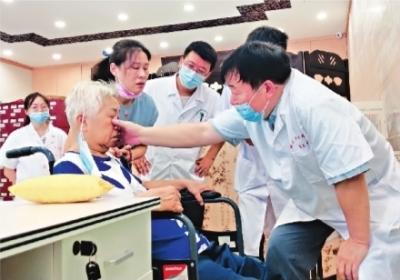Residents can also watch at the gates doctors
of traditional Chinese medicine community hospital Zuozhen famous sinking
Professor Wang Ping (first from right) understands the physical condition of residents.
Photo by correspondent Tang Han
Changjiang Daily (Reporter Yu Danxia, Huang Qi, correspondent Jing Jing Tang Han) Recently, "Qihuang Scholar Studio" was unveiled at the Hanzhong Street Community Health Service Center in Qiaokou District. Wang Ping, a national "Qihuang Scholar", a leading medical talent in Hubei Province, the vice president of Hubei University of Traditional Chinese Medicine, a second-level professor, the chief physician of TCM internal medicine, and a doctoral tutor, together with his team, provides a pulse consultation for residents.
"Qihuang Scholars" are assessed by the State Administration of Traditional Chinese Medicine. They are professional and technical personnel who have made major achievements and outstanding achievements in clinical practice of Chinese medicine or basic theoretical research and applied research of Chinese medicine, and have high academic influence at home and abroad. This is the first time that Wang Ping has set up an expert studio at the grassroots level. He initially selected two doctors and one master to sink into the center with him to carry out long-term and regular primary consultations, ward rounds, and training.
"Every morning I get a bitter taste in my mouth and my gums are often swollen and sore. What's the matter?" Wu Juan, 52, asked in person. Professor Wang Ping took the pulse to look at the tongue coating, and after inquiring about her living habits, she told her: "You belong to the heart and anger. Don't argue with others. You can usually eat some fruits rich in vitamin C, drink some yogurt, exercise properly, and keep it well. Feeling and regular living habits, adjust your mentality." Wu Juan told Changjiang Daily reporter that the weather is hot and she is very happy to find famous Chinese medicine experts at her door and enjoy the high-quality Chinese medicine service of the doctoral supervisor and the master's team.
According to the person in charge of the Qiaokou District Health Bureau, Professor Wang Ping and his team will visit the center every week. They are good at treating Alzheimer’s, chronic diseases, insomnia, forgetfulness, headaches, dizziness, stroke, epilepsy, endocrine disorders, radiotherapy and chemotherapy. After surgery, patients with intractable diseases such as physical weakness, numbness and chills are treated.
At the end of April this year, Wuhan City launched the "Ten Thousand Doctors Entering the Community" campaign. Throughout this year, the city has selected 10,000 doctors from the provincial and municipal hospitals and CDCs to more than 200 community health centers. Service centers (township health centers) work so that citizens can enjoy the services of secondary and tertiary hospitals at their doorsteps.
The reporter learned randomly from Jiangxia District, Qiaokou District, Huangpi District and other districts that every community health service center (township health center) usually has doctors from large hospitals who go to the grassroots for consultation, even if it is more remote like Fasi Health Center. Township health centers in China can also get the guidance and help of experts from major hospitals.
Experts believe that lowering the level of doctors to the grassroots level will help promote the city's hierarchical diagnosis and treatment, and save the time and cost of medical treatment for patients. Doctors in major hospitals play the role of "passing and leading" to help improve the service capabilities of grassroots medical and health institutions, which is of great significance to "strengthening grassroots" after the epidemic.

